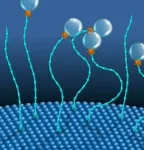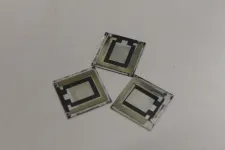(Press-News.org) May 4, 2023, TORONTO – Ontario research teams investigating new ways to treat cancer are taking the crucial next steps to bring their discoveries to patients thanks to support from the Ontario Institute for Cancer Research (OICR).
OICR announced it is funding five Ontario-based drug discovery projects between $150,000 and $300,000 per project through its Cancer Therapeutics Innovation Pipeline (CTIP) initiative. CTIP supports research into promising molecules that could become the next generation of cancer therapeutics.
This year’s cohort of CTIP projects aims to develop treatments for some of the most devastating cancers, including pancreatic cancer, ovarian cancer, breast cancer and late-stage prostate cancer.
Beyond funding, CTIP’s committee of experts from academia and industry advises research teams on the science and approaches needed to advance their discoveries, and the strategy to attract the partnerships and investments needed to bring a new drug to the clinic.
“Ontario is home to many talented drug discovery researchers, and OICR created CTIP to guide them through the challenges of the drug discovery process,” says OICR President and Scientific Director, Dr. Laszlo Radvanyi. “These exciting new projects have the potential to make a major difference in the lives of people with cancer, and we want to help realize that potential as soon and as impactfully as possible.”
The 2023 CTIP projects include:
Early Validation Projects
Dr. Fred Dick of Western University and Lawson Health Research Institute is investigating new therapies to treat ovarian cancer more effectively by targeting ‘dormant’ cancer cells. Ovarian cancers are usually treated by chemotherapy, but ovarian cancer cells can survive treatment by entering a period of dormancy and then spreading again once treatment is done. Dick and colleagues have uncovered a process that keeps dormant cells alive and will use OICR support to look for ways to disrupt this survival mechanism.
“By going after ‘dormant’ cancer cells that elude the usual treatment options, we aim to prevent ovarian cancer from returning, and stop it once and for all.” – Dr. Fred Dick
Dr. Richard Austin and Dr. Bobby Shayegan from McMaster University and St. Joseph's Healthcare Hamilton are hoping to develop a new drug for prostate cancer that is effective against late-stage disease, when it is usually the hardest to treat. Austin, Shayegan and colleagues have created a synthetic antibody that targets a protein on the surface of prostate cancer cells, which plays a key role in the growth of tumours. After demonstrating promising results of shrinking tumours in mice, they will use CTIP funding to take the next steps toward advancing this potentially first-in-class therapeutic.
“Once prostate cancer spreads, it becomes much more difficult to treat. But we have found an exciting new way to attack prostate cancer cells that could provide new hope to countless men.” – Dr. Richard Austin
Early Accelerator Projects
Dr. Razqallah Hakem and Dr. Mark Reed of the University Health Network are exploring new ways to treat breast and ovarian cancer patients with BRCA1 and BRCA2 gene mutations. These mutations can restrain the body from repairing damaged DNA, which makes people more susceptible to developing cancer. Although patients with these mutations initially respond well to current therapeutic strategies, they develop resistance and recurrence of their tumours. Hakem and Reed identified a novel factor essential for cancer cell survival. They will use OICR funding to test about 25,000 molecules with the goal of identifying those that inhibit their novel factor and kill cancer cells.
“Cancer is stubbornly good at resisting treatments, so it’s crucial to keep innovating. The approach we’re exploring could provide transformative new options for people with BRCA-mutant breast and ovarian cancers.” – Dr. Razqallah Hakem
Dr. Grant Brown of the University of Toronto and Dr. Rima Al-awar of OICR are looking for ways to maximize the effects of gemcitabine, a chemotherapy and one of the few treatments that is effective against pancreatic cancer. Brown and colleagues have found that ‘deactivating’ two genes makes gemcitabine kill pancreatic cancer cells more effectively. With their CTIP award, they will look for chemicals that inhibit the proteins made by these genes in the hopes of finding drugs that can be paired with gemcitabine to more effectively treat one of the deadliest forms of cancer.
“Pancreatic cancer moves quickly, so we need to harness all the tools we have to stop it. Our work aims to take one of the best treatment options for pancreatic cancer to the next level.” – Dr. Grant Brown
Dr. Michael Olson, Dr. Marc Adler and Dr. Russell Viirre of Toronto Metropolitan University are investigating alternative treatments for ovarian cancer that has spread to other parts of the body. Only 20-30 per cent of women survive ovarian cancer when it is diagnosed in the late stages, and treatment options are limited in those stages. But researchers have discovered that disrupting the activity of a particular protein has the potential to kill ovarian cancer cells throughout the body. Thanks to support from OICR, Olson and colleagues will test how tumours respond when the protein is inhibited using three-dimensional ‘patient-derived organoids’ and work to develop new compounds that target the protein.
“Women with advanced ovarian cancer need improved treatment options against this really difficult disease. We hope our unique approach can help deliver an alternative treatment that gives them a better chance of living – and living well.” – Dr. Michael Olson
Including these projects, CTIP has now funded 26 studies since the program launched in 2017.
“The Ontario government is proud to support ground-breaking research that can advance new discoveries and innovation in cancer research,” said Jill Dunlop, Minister of Colleges and Universities. “The initiatives funded by OICR’s Cancer Therapeutics Innovation Pipeline are key to developing new drugs and treatments that have the potential to help patients who are battling cancer lead longer and healthier lives.”
OICR is a collaborative, not-for-profit research institute funded by the Government of Ontario. We conduct and enable high-impact translational cancer research to accelerate the development of discoveries for patients around the world while maximizing the economic benefit of this research for the people of Ontario. For more information visit http://www.oicr.on.ca.
The views expressed are those of OICR and do not necessarily reflect the views of the Province of Ontario.
END
Investment in Ontario drug discovery research will help develop new cancer medicines for patients
OICR announces support for five projects through its Cancer Therapeutics Innovation Pipeline (CTIP)
2023-05-04
ELSE PRESS RELEASES FROM THIS DATE:
Machine learning can support urban planning for energy use
2023-05-04
As Philadelphia strives to meet greenhouse gas emissions goals established in its 2050 Plan, a better understanding of how zoning can play a role in managing building energy use could set the city up for success. Researchers in Drexel University’s College of Engineering are hoping a machine learning model they’ve developed can support these efforts by helping to predict how energy consumption will change as neighborhoods evolve.
In 2017, the city set a goal of becoming carbon neutral by 2050, led in large part by a reduction in greenhouse gas emissions from building energy use – which ...
University of Toronto researchers use generative AI to design novel proteins
2023-05-04
Researchers at the University of Toronto have developed an artificial intelligence system that can create proteins not found in nature using generative diffusion, the same technology behind popular image-creation platforms such as DALL-E and Midjourney.
The system will help advance the field of generative biology, which promises to speed drug development by making the design and testing of entirely new therapeutic proteins more efficient and flexible.
“Our model learns from image representations to generate fully new proteins, at a very high rate,” says Philip ...
St. Jude tool gets more out of multi-omics data
2023-05-04
(MEMPHIS, Tenn. – May 04, 2023) Despite the astounding advances made in understanding the biologic underpinnings of cancer, many cancers are missing obvious genetic drivers. When scientists can’t pinpoint the factors that drive cancer, treating it can be much more difficult. Scientists at St. Jude Children’s Research Hospital hope to solve that problem with an updated way to analyze multi-omic (primarily transcriptomics and proteomics) data. The researchers created a next-generation computational tool to gain new insights from biological data ...
Alternative fuel for string-shaped motors in cells
2023-05-04
Cells have a fascinating feature to neatly organize their interior by using tiny protein machines called molecular motors that generate directed movements. Most of them use a common type of fuel, a kind of chemical energy, called ATP to operate. Now researchers from the Max Planck Institute of Molecular Cell Biology and Genetics (MPI-CBG), the Cluster of Excellence Physics of Life (PoL) and the Biotechnology Center (BIOTEC) of the TU Dresden in Dresden, Germany, and the National Centre for Biological Sciences (NCBS) in Bangalore, India, discovered a novel molecular system that uses an alternative chemical energy and employs a novel mechanism ...
How seaweed has been misleading scientists about reef health
2023-05-04
For decades, scientists have looked to seaweed as an indicator of the health of coral reefs lying underneath.
But what if the seaweed was misleading them?
New UBC research reveals it was, and scientists need new ways to determine whether human activity is harming a particular reef.
"This is especially critical today, given that reefs globally are threatened by climate-driven stressors,” said Dr. Sara Cannon, a postdoctoral fellow at the UBC Institute for the Oceans and Fisheries and the study's lead author.
Local species ...
CityU researchers develop an additive to efficiently improve the efficiency and stability of perovskite solar cells
2023-05-04
Perovskite solar cells (PVSCs) are a promising alternative to traditional silicon-based solar cells because of their high power-conversion efficiency and low cost. However, one of the major challenges in their development has been achieving long-term stability. Recently, a research team from City University of Hong Kong (CityU) made a breakthrough by developing an innovative multifunctional and non-volatile additive which can improve the efficiency and stability of perovskite solar cells by modulating perovskite film growth. This simple and effective strategy has great potential for facilitating the commercialisation of PVSCs.
“This type of multifunctional ...
Research reveals longstanding cultural continuity at oldest occupied site in West Africa
2023-05-04
Evidence from West Africa about human evolution remains scarce, but recent research has indicated unique patterns of cultural change in comparison to other regions of the continent. A new article in the journal Nature Ecology and Evolution adds to our understanding with a study of the oldest directly dated archaeological site in West Africa. The site shows technological continuity spanning roughly 140,000 years and offers insights into the ecological stability of the region.
Our species emerged in Africa around 300 thousand years ago and ...
A simple antibacterial treatment solves a severe skin problem caused by radiation therapy
2023-05-04
BRONX, NY—May 4, 2023—Acute radiation dermatitis (ARD)—characterized by red, sore, itchy or peeling skin—affects up to 95% of people undergoing radiation treatment for cancer. Severe cases can cause significant swelling and painful skin ulcers that can severely impair quality of life, yet little is known about why this condition occurs and no standardized treatments for preventing severe ARD have been widely adapted.
Researchers at Montefiore Einstein Cancer Center (MECC) have found that many cases of ARD involve a common skin bacterium and that a simple, low-cost treatment ...
Fred Hutch study highlights racial disparities in ovarian cancer risk for women
2023-05-04
SEATTLE, WA — May 4, 2023 — A new Fred Hutchinson Cancer Center study in the journal Obstetrics & Gynecology investigated how endometriosis, uterine leiomyomas (also known as fibroids) and a common intervention for these conditions—hysterectomy—changed ovarian cancer risk in Black and white women.
Scientists found fibroids were associated with an increased risk of ovarian cancer in both Black and white women, with hysterectomy modifying the risk of cancer in both groups. However, researchers also found that while Black and white women with endometriosis had a higher risk of ovarian cancer overall, hysterectomy only ...
Vanishing glaciers threaten alpine biodiversity
2023-05-04
Vanishing glaciers threaten alpine biodiversity
With glaciers melting at unprecedented rates due to climate change, invertebrates that live in the cold meltwater rivers of the European Alps will face widespread habitat loss, warn researchers.
Many of the species are likely to become restricted to cold habitats that will only persist higher in the mountains, and these areas are also likely to see pressures from the skiing and tourism industries or from the development of hydroelectric plants.
The research study – led jointly by the University of Leeds and ...
LAST 30 PRESS RELEASES:
How much sleep do teens get? Six-seven hours.
Patients regain weight rapidly after stopping weight loss drugs – but still keep off a quarter of weight lost
GLP-1 diabetes drugs linked to reduced risk of addiction and substance-related death
Councils face industry legal threats for campaigns warning against wood burning stoves
GLP-1 medications get at the heart of addiction: study
Global trauma study highlights shared learning as interest in whole blood resurges
Almost a third of Gen Z men agree a wife should obey her husband
Trapping light on thermal photodetectors shatters speed records
New review highlights the future of tubular solid oxide fuel cells for clean energy systems
Pig farm ammonia pollution may indirectly accelerate climate warming, new study finds
Modified biochar helps compost retain nitrogen and build richer soil organic matter
First gene regulation clinical trials for epilepsy show promising results
Life-changing drug identified for children with rare epilepsy
Husker researchers collaborate to explore fear of spiders
Mayo Clinic researchers discover hidden brain map that may improve epilepsy care
NYCST announces Round 2 Awards for space technology projects
How the Dobbs decision and abortion restrictions changed where medical students apply to residency programs
Microwave frying can help lower oil content for healthier French fries
In MS, wearable sensors may help identify people at risk of worsening disability
Study: Football associated with nearly one in five brain injuries in youth sports
Machine-learning immune-system analysis study may hold clues to personalized medicine
A promising potential therapeutic strategy for Rett syndrome
How time changes impact public sentiment in the U.S.
Analysis of charred food in pot reveals that prehistoric Europeans had surprisingly complex cuisines
As a whole, LGB+ workers in the NHS do not experience pay gaps compared to their heterosexual colleagues
How cocaine rewires the brain to drive relapse
Mosquito monitoring through sound - implications for AI species recognition
UCLA researchers engineer CAR-T cells to target hard-to-treat solid tumors
New study reveals asynchronous land–ocean responses to ancient ocean anoxia
Ctenophore research points to earlier origins of brain-like structures
[Press-News.org] Investment in Ontario drug discovery research will help develop new cancer medicines for patientsOICR announces support for five projects through its Cancer Therapeutics Innovation Pipeline (CTIP)






